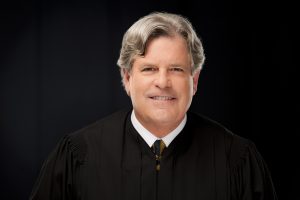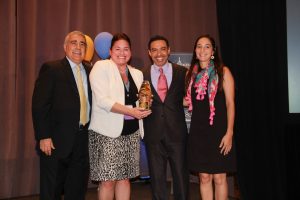 The National Council of Juvenile and Family Court Judges (NCJFCJ) announced two honorees of the 3rd annual Justice Innovation Awards recognizing the national Innovator of the Year and the Impact of the Year recipients: the Honorable Timothy Connors of the 22nd Circuit Court in Washtenaw County, Mich. and the Latin American Youth Center in Washington, D.C. The honorees were recognized at the NCJFCJ’s 80th Annual Conference highlighting informative presentations on current and cutting edge topics that inspired, provoked and precipitated discussions about issues facing the juvenile and family court system.
The National Council of Juvenile and Family Court Judges (NCJFCJ) announced two honorees of the 3rd annual Justice Innovation Awards recognizing the national Innovator of the Year and the Impact of the Year recipients: the Honorable Timothy Connors of the 22nd Circuit Court in Washtenaw County, Mich. and the Latin American Youth Center in Washington, D.C. The honorees were recognized at the NCJFCJ’s 80th Annual Conference highlighting informative presentations on current and cutting edge topics that inspired, provoked and precipitated discussions about issues facing the juvenile and family court system.
The Innovator of the Year Award honors an active, in-good-standing NCJFCJ member who has inspired, sponsored, promoted or led an innovation or accomplishment of national significance in juvenile justice, child abuse and neglect, family law, and/or domestic violence. The Impact of the Year Award recognizes, from the Annual Conference-host state (Washington, D.C.), an individual, state/local court, law firm, advocacy group, or service provider who has been instrumental in leading or implementing significant improvements or innovations which advance the mission of the NCJFCJ.
“It is our privilege to recognize the outstanding work of both Judge Connors and the team at the Latin American Youth Center,” said Judge Anthony (Tony) Capizzi, NCJFCJ president. “We honor their tireless commitment to improving the lives of children and families, especially those in our justice system. We hope that we can continue to raise awareness of the core issues that affect our nation’s families.”
Judge Connors serves as co-chair of the Michigan Tribal-State-Federal Forum, instrumental in drafting the Michigan Indian Family Preservation Act. In 2013, he was awarded a grant by the Michigan Supreme Court to determine whether tribal peacemaking values and practices could be implemented in a state court system. As presiding judge of the Washtenaw County Peacemaking Court, he has fostered the healing of important relationships among litigants in child welfare, family and probate cases by incorporating Native American peacemaking principles and philosophies in conflict resolution.
“I am forever grateful to the Michigan Supreme Court, the University of Michigan Law School, and now the NCJFCJ for opening this path of Peacemaking and restorative justice in state court systems,” said Judge Connors. “This path is the creation of the collaborative effort of the National American Indian Court Judges Association, the Native American Rights Fund Indigenous Peacemaking Initiative and the Michigan Tribal State Federal Forum to find common ground. This common ground greatly benefits our youth, our families and our communities. I hope all of our states will choose to walk this path together.”
“This is a great national honor that Judge Connors has received, and it is well deserved,” said Justice Bridget M. McCormack, Michigan Supreme Court. “For many years, Judge Connors has shown a remarkable dedication to implementing tribal and community court peacemaking principles to resolve cases. In fact, his court was the first in Michigan to adopt the use of these principles, and his success in this area has prompted other states to take notice. His passion for applying justice in collaborative and innovative ways is nothing short of inspiring.”
“Judge Connors honors and respects the traditions of the tribes and tribal justice systems that provided the foundational knowledge and peacemaking principles for his court,” said Nikki Borchardt Campbell, Executive Director, National American Indian Court Judges Association. “We believe these restorative principles can be beneficial to participants when applied correctly and in the exact manner that Judge Connors has applied them in his court. His court and his approach are shining examples. We are proud of his work and his contribution to both state and tribal courts.”
 The Latin American Youth Center’s (LAYC) mission is to empower a diverse population of youth to achieve a successful transition to adulthood, through multi-cultural, comprehensive, and innovative programs that address youths’ social, academic, and career needs. The LAYC works with every young person who comes through their doors, to help them develop the skills and self-confidence they need to make a successful transition to young adulthood. The LAYC offers bilingual programs and services designed to address the multiple needs of the young people and families in the community.
The Latin American Youth Center’s (LAYC) mission is to empower a diverse population of youth to achieve a successful transition to adulthood, through multi-cultural, comprehensive, and innovative programs that address youths’ social, academic, and career needs. The LAYC works with every young person who comes through their doors, to help them develop the skills and self-confidence they need to make a successful transition to young adulthood. The LAYC offers bilingual programs and services designed to address the multiple needs of the young people and families in the community.
 They have services to help youth achieve independent living, job training, substance abuse treatment programs, and a teen mom’s program. Their areas of service include: Academics, with year-round tutoring and homework assistance, after-school programs, GED exam preparation and education, and college preparation and retention; Arts and Recreation, offering art and media programs, out-of-school time recreation, and mentoring; Job Readiness, with job preparedness and life skills training, job placement services, internships, and career exploration; Safe Housing, offering short- and long-term family-based and transitional living programs for homeless and runaway youth with special programs for young families and LGBTQ-identifying youth; and Health and Wellness, providing welcoming, non-clinical settings for sexual health education and HIV/STI/pregnancy testing and counseling, mental health and substance use disorders treatment, and parenting skills for young parents.
They have services to help youth achieve independent living, job training, substance abuse treatment programs, and a teen mom’s program. Their areas of service include: Academics, with year-round tutoring and homework assistance, after-school programs, GED exam preparation and education, and college preparation and retention; Arts and Recreation, offering art and media programs, out-of-school time recreation, and mentoring; Job Readiness, with job preparedness and life skills training, job placement services, internships, and career exploration; Safe Housing, offering short- and long-term family-based and transitional living programs for homeless and runaway youth with special programs for young families and LGBTQ-identifying youth; and Health and Wellness, providing welcoming, non-clinical settings for sexual health education and HIV/STI/pregnancy testing and counseling, mental health and substance use disorders treatment, and parenting skills for young parents.
“The work we do at the Latin American Youth Center is truly a collaboration between compassionate District Court judges like the Honorable Hiram Puig-Lugo who committed to supporting our communities, the dedicated staff of D.C.’s Children and Family Services Administration, and LAYC’s team of youth developers and social workers going above and beyond for each youth who comes through our doors,” said Lori M. Kaplain, president and CEO, LAYC. “Together, through innovative and community-based collaboration, we’re able to make a real difference in the lives of our most vulnerable youth, in particular for youth of color and immigrant youth. We are truly humbled and appreciative of this award.”
“The Latin American Youth Center has a long and distinguished history of dedicated support for families in the Washington, D.C. area,” said the Honorable Hiram Puig-Lugo, Superior Court of the District of Columbia. “Their commitment to service has helped countless immigrant and non-immigrant youth navigate the difficult journey from adolescence into adulthood. They are a valuable, integral and indispensable part of our community.”